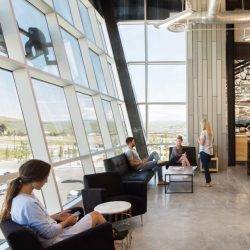August 20, 2018
Employers who do not offer flexible working are the exception rather than rule
 Most organisations already offer some sort of flexible working and over half of employees now ask to work flexibly, a new survey from XpertHR research has claimed. One in 12 organisations (8.1 percent) reported that all employees worked flexibly, with employers attributing the rise to a more supportive workplace culture and the impact of recent legal changes. The survey found that more than half (55.9 percent) had seen an increase in flexible working requests over the past two years. Three out of four believed that this was due to changes in workplace culture in recent years, attributable in part to a change in the law in 2014 that extended the right to request flexible working to all employees with at least 26 weeks’ service. Flexible working goes across the board, and includes part-time working, variable start and finish times, home-working and other options.
Most organisations already offer some sort of flexible working and over half of employees now ask to work flexibly, a new survey from XpertHR research has claimed. One in 12 organisations (8.1 percent) reported that all employees worked flexibly, with employers attributing the rise to a more supportive workplace culture and the impact of recent legal changes. The survey found that more than half (55.9 percent) had seen an increase in flexible working requests over the past two years. Three out of four believed that this was due to changes in workplace culture in recent years, attributable in part to a change in the law in 2014 that extended the right to request flexible working to all employees with at least 26 weeks’ service. Flexible working goes across the board, and includes part-time working, variable start and finish times, home-working and other options.












 At the risk of stating the obvious, with the Met Office suggesting temperatures could reach their peak on Friday (27 July) in some areas of the UK, Britain’s largest employer organisation is encouraging companies to consider ‘a range of measures to keep employees comfortable during the heatwave’. Matthew Fell, CBI Chief UK Policy Director, said: “While the current hot spell has provided welcome fillip for consumer-facing sectors, large numbers of employees are feeling the heat as they carry out their day-to-day tasks, especially those working outdoors. Responsible employers take the welfare of their employees very seriously, particularly during this unusual weather. Companies can help keep their employees cool by considering a range of measures, from flexible working to help those with punishing commutes to relaxed dress codes, so staff feel more comfortable in their place of work. Ultimately a common sense approach is needed, as some employees will have less flexibility than others, for example those wearing safety equipment on construction sites. In all cases, staff should have easy access to drinking water as temperatures soar to help keep them healthy and productive.”
At the risk of stating the obvious, with the Met Office suggesting temperatures could reach their peak on Friday (27 July) in some areas of the UK, Britain’s largest employer organisation is encouraging companies to consider ‘a range of measures to keep employees comfortable during the heatwave’. Matthew Fell, CBI Chief UK Policy Director, said: “While the current hot spell has provided welcome fillip for consumer-facing sectors, large numbers of employees are feeling the heat as they carry out their day-to-day tasks, especially those working outdoors. Responsible employers take the welfare of their employees very seriously, particularly during this unusual weather. Companies can help keep their employees cool by considering a range of measures, from flexible working to help those with punishing commutes to relaxed dress codes, so staff feel more comfortable in their place of work. Ultimately a common sense approach is needed, as some employees will have less flexibility than others, for example those wearing safety equipment on construction sites. In all cases, staff should have easy access to drinking water as temperatures soar to help keep them healthy and productive.”








 Almost half (49 percent) of companies are struggling to find skilled workers as digitisation and automation cause significant change in the skills businesses look for in professionals, according to new data from Robert Half UK. As a result, one fifth (21 percent) are now looking to recruit candidates with exceptional soft skills, with a view to developing the desired technical skills on the job. In the Robert Half research, UK business leaders consider an openness to new ideas (28 percent), an openness to change (26 percent) and good communication abilities (19 percent) as key attributes and will prioritise these areas when considering new talent. Digitisation and automation are rapidly evolving the business world. Companies are having to quickly adapt to the changing world of work, and are looking for employees who can keep pace,” says Matt Weston, UK Managing Director at Robert Half.
Almost half (49 percent) of companies are struggling to find skilled workers as digitisation and automation cause significant change in the skills businesses look for in professionals, according to new data from Robert Half UK. As a result, one fifth (21 percent) are now looking to recruit candidates with exceptional soft skills, with a view to developing the desired technical skills on the job. In the Robert Half research, UK business leaders consider an openness to new ideas (28 percent), an openness to change (26 percent) and good communication abilities (19 percent) as key attributes and will prioritise these areas when considering new talent. Digitisation and automation are rapidly evolving the business world. Companies are having to quickly adapt to the changing world of work, and are looking for employees who can keep pace,” says Matt Weston, UK Managing Director at Robert Half.















July 31, 2018
Google should be an example to all when it come to interactive workplace design
by Alice Porter • Comment, Workplace design
More →